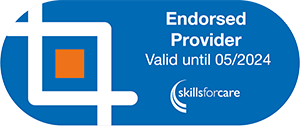Supporting care providers throughout England and Wales for many years we have found that no two businesses approach their training in exactly the same way. However there are some common themes and subjects that will fit all.
Staff training should to be mapped to the requirements of your care setting. The needs of the residents and staff within your care identified through a robust training analysis and risk assessment linked to each staff members competency.
Skills for Care have released their Mandatory Training Framework as a guide for providers listing subjects that Skills for Care (and therefore CQC) would expect care staff to be competent in. The Mandatory Training Framework is the natural progression once the Care Certificate has been completed and the expectation is to maintain or improve the levels of competency thereafter.
The goal is to have competent staff working autonomously and effectively. This does not naturally happen by simply expecting staff to complete the same courses year after year. By analysing and evidencing staff competency regularly it becomes easier to create relevant learning programmes. Gone are the days of thrashing your staff with the same course content simply because it the ‘training is due’.
The focus has moved slightly towards evaluating and evidencing competency which will then illuminate the various training routes required. These competency checks should be done frequently to avoid accidents or incidents.
Below we have listed the Mandatory Course Framework proposed by Skills for Care and offered some guidance on the various training and assessment frequencies to consider alongside your own continuous risk assessments and training analysis, taking into account staff responsibilities and your care provision.
You will notice that it is suggested the majority of the courses are refreshed “at least every 3 years”. The Framework outlines the minimum frequency of training required. It is highly unlikely that a care provider will be able to avoid risks effectively and establish an outstanding rating based on doing the training every 3 years. Our guidance encourages for the assessment and competency checks to be far more frequent and carried out in a dynamic fashion, compared to simply refreshing training every 3 years.
The courses are listed as Skills For Care refer to them and you will find links to the courses and competency tests which can be obtained via Redcrier which may have slightly different course titles. As care is holistic, we have also offered suggestions where other ‘related courses’ may be appropriate.
By clicking on the subject titles below you will be able to find out about the learning outcomes and course content for each subject. If you have any questions relating to compliance and mandatory training call us for help 01823 332200.
| Subject | Guidance | Related Content |
|---|---|---|
|
|
Learning and development should be practical where possible. Refresher training and competency checks should take place at least annually. Training content needs to be reviewed so that it is relevant every time a new risk is introduced.
|
Dignity and Respect
Pressure Sores Prevention and Awareness
|
|
Basic Life Support and First Aid
|
Care providers must provide adequate personnel to respond if someone is taken ill or injured at work. It’s the employer’s responsibility to establish how many staff need First Aid training and to what level based on risk assessment. Training should take place at least annually with more frequent competency checks to solidify understanding and highlight areas of potential improvement. The Resuscitation Council (UK) suggest that frequent low dose training may improve CPR skills compared with conventional training strategies’ noting that it is widely accepted that skills decay within 3 to 6 months after initial training. The Resuscitation Council (UK) guidelines can be found here: https://www.resus.org.uk/library/2015-resuscitation-guidelines
Training refreshers should take place at least every 3 years to be recognised as competent.
|
Fire Safety and Awareness
|
| Communication | Monitor performance regularly, test competency at least once per year then provide learning and development opportunities as and when required at least every 3 years.
|
Person Centred Approaches
|
| Dignity
|
Monitor performance regularly, test competency at least once per year then provide learning and development opportunities as and when required at least every 3 years.
|
Mental Capacity Act
Equality Diversity and Inclusion
|
| Equality and Diversity | Monitor performance regularly, test competency at least once per year then provide learning and development opportunities as and when required at least every 3 years.
|
Safeguarding Adults
|
|
|
Fire training should be refreshed at least annually and fire drills should be carried out at least annually. You will have to risk assess the different environments where your various staff teams and service users reside.
|
Risk Assessment
|
|
|
By law all workers involved in the handling, preparation and provision of food are required to receive appropriate training so that they understand how to handle food properly. Monitor performance regularly, test competency at least once per year then provide learning and development opportunities as and when required at least every 3 years.
|
Infection Control
|
| Health and Safety Awareness
|
Monitor performance regularly, test competency at least once per year then provide learning and development opportunities as and when required at least every 3 years.
|
Infection Control
|
|
Infection Prevention and Control
|
Monitor performance regularly, test competency at least once per year then provide learning and development opportunities as and when required at least every 3 years.
|
COSHH
|
|
|
NICE recommend that both care home staff and community-based care workers should refresh medication administration training and have competency tests annually. The workers role and responsibilities will dictate the level of learning and development required. Training and competency checks need to be relevant to the duties expectations and responsibilities of the role. A complete and documented competency should take place initially prior to the carer managing or administering any form of medication.
|
Record Keeping
|
|
Mental Capacity and Liberty Safeguards
|
Monitor performance regularly, test competency at least once per year then provide learning and development opportunities as and when required at least every 3 years.
|
Mental Health Matters
|
| Moving and Handling Objects
|
HSE research findings suggests that annual refresher training for this subject would be good practise. Monitor performance regularly, test competency at least once per year then provide learning and development opportunities as and when required at least every 3 years.
|
Risk Assessment
|
|
|
You should constantly monitor the performance of your staff and assess competency at least annually. Create opportunity for learning and development when identified or at least every 3 years.
|
Diabetes
|
| Oral Health
|
You should constantly monitor the performance of your staff and assess competency at least annually. Create opportunity for learning and development when identified or at least every 3 years.
|
Dignity and Respect |
|
|
Monitor performance regularly, test competency at least once per year then provide learning and development opportunities as and when required at least every 3 years.
|
Care Planning
Equality, Diversity and Inclusion
|
|
Positive Behaviour Support and non Restrictive Practise
|
Monitor performance regularly, test competency at least once per year then provide learning and development opportunities as and when required at least every year.
|
|
|
|
Monitor performance regularly, test competency at least once per year then provide learning and development opportunities as and when required at least every 3 years.
|
Communication
|
|
|
Monitor performance regularly, test competency at least once per year then provide learning and development opportunities as and when required at least every year.
|
|
| Safeguarding Children
|
Monitor performance regularly, test competency at least once per year then provide learning and development opportunities as and when required at least every year.
|
Safeguarding Adults |
| Specific Conditions
|
This section is a catch all and has been known in the sector as Person Centred Care, ie; if someone in your care (including your staff) has a particular condition or requirement, then the relevant sections of your staff team need to be competent and understand said condition or requirement. As many of the other subjects the guidance is, monitor performance regularly, test competency at least once per year, providing learning and development opportunities as and when required at least every 3 years. But this will obviously need to be reviewed as a new risk in introduced.
|
Parkinson’s
|
We appreciate that you have a lot to consider trying to coordinate all of the above based on dynamic risk assessments, which is why we have produced a series of digital tools to help you. You can engage your staff and streamline competency checks with eCompetency. You can carve out learning plans based on your areas of strength and weakness – identified through bespoke reporting via eBox digital training system. You can always just talk to us for guidance and advice. Call us today for help to plan your training efficiently 01823 332200.





